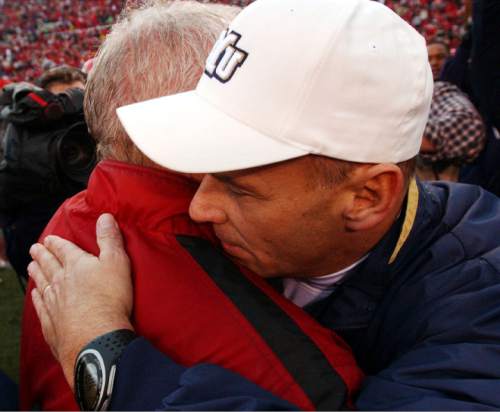This is an archived article that was published on sltrib.com in 2016, and information in the article may be outdated. It is provided only for personal research purposes and may not be reprinted.
Ron McBride knew Maui Mike and the Seaweed Man. That's how he thrived in recruiting Polynesian football players from Hawaii to the University of Utah, by developing relationships and building a pipeline that's credited for much of the Utes' success of the past 25 years.
"We've just been perpetuating it ever since," said Ute coach Kyle Whittingham.
McBride's in-roads, the Polynesian influx in Utah and the growth of football in the culture have created a major dynamic of the Utah-BYU rivalry, being renewed Saturday night at Rice-Eccles Stadium. Of the 88 players on the combined two-deep rosters, 38 are of Polynesian heritage (21 for BYU, 17 for Utah). More than half of each team's Polynesian athletes attended high schools in the state.
That's the biggest change from McBride's era. His pursuit of players on the islands required considerable effort, both in discovering them and in persuading them to come to Utah instead of BYU. With so many Polynesian families having adopted Utah as their home and football increasingly becoming part of the culture, those players are now in the backyards of the Utes, Cougars and Aggies. Gary Andersen successfully used McBride's blueprint of Polynesian recruiting in reviving Utah State's program.
"There are so many good Polynesian players in the state now," McBride said. "Every school has a couple guys; I don't care where you go."
And those players are becoming prized recruits. The in-state schools must compete with Pac-12 programs and others that have discovered Utah as a productive area.
Football is "a big deal in the Polynesian culture," said Utah tight end Evan Moeai. "A lot of times it's a way for Polynesian kids to get an education and … that's a huge benefit."
Vai Sikahema, a former BYU running back and a member of the recently founded Polynesian Football Hall of Fame, believes the culture is "easily transferable" to football, with respect for authority and communal efforts. Even traditional dances help develop timing and footwork. "Football coaches love big guys who have nimble feet," Sikahema said.
The cultural element within BYU's team creates "a bond," said defensive back Kai Nacua, "because Polynesians are known for being very involved in family. And that's what we have brought into this program, is making sure everyone is looking out for each other and have each other's back, no matter what."
Those traits may have surfaced negatively in 2014 when Nacua was a central figure in the brawl after the Miami Beach Bowl, but they're also among the reasons teammates voted him as one of their captains this season.
Polynesian players from Hawaii initially helped former coach LaVell Edwards build his program in an era when recruiting African-American athletes to Provo was particularly difficult. Before McBride took over Utah's program in 1990, "We'd go over there and pick out the ones we wanted," Edwards said. "That wasn't the case anymore."
Former Utah defensive coordinator Kalani Sitake is now BYU's coach and three of his assistants are Polynesian, so Utah's dominance of in-state recruiting may be diminished — although Whittingham said the schools usually compete directly for only a few players.
A native of Tonga, Sitake wants to be known as more than a recruiter of Polynesian players. "I hate focusing on one group. … We just have really good guys that love to play the game and they are tough," he said. "And some of them happen to be Polynesian, some of them happen to be African-American and some of them happen to be Caucasian."
Nacua's brother, Samson, is a Utah defensive back. He was not among the five true freshmen who played for the Utes last week vs. Southern Utah and is unlikely to compete against his brother Saturday. Even so, Polynesians will be well represented in a game that extends McBride's legacy at Utah.
Somehow, the impact of a coach the school once fired just keeps increasing in his retirement years. The Utes' continuing Polynesian influence has justified his recent induction into the Crimson Club Hall of Fame, that's for sure.
Twitter: @tribkurt —
Polynesian players to watch
The Polynesian Football Hall of Fame presents a college player of the year award. Of the 38 players on the 2016 watch list, 10 are from Utah schools.
Player School Pos.
Ricky Ali'ifua USU DL
Issac Asiata Utah OL
Harvey Langi BYU DL
Ului Lapuaho BYU OL
Lowell Lotulelei Utah DL
Kai Nacua BYU DB
Logan Taele BYU DL
Pita Taumoepenu Utah DL
Sae Tautu BYU DL
Travis Tuiloma* BYU DL
* Injured; will not play vs. Utah
—
More coverage
BYU notes • Back from a foot injury that sidelined him most of last season, QB Taysom Hill says he hasn't lost a step. > B2 Utah notes • After lackluster game against SUU, Utes' offense wants to get more physical. > B2



